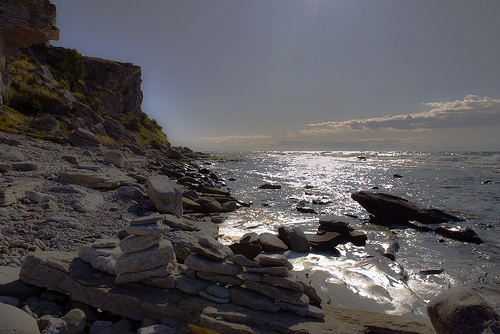Bring me the birds of Rhiannon—
the ones that rouse the dead and make
the living sleep—to entertain me
that night. —The Mabinogi
Ram skulls I brought home from the fields
line the wall and survey the borage
that has spread wild up by the house,
Bring me the birds of Rhiannon—
the ones that rouse the dead and make
the living sleep—to entertain me
that night. —The Mabinogi
Ram skulls I brought home from the fields
line the wall and survey the borage
that has spread wild up by the house,
By VALERIE DUFF
We are following the hearse,
the body in the hearse steady
as a tree, Not my father
any longer jagged timber,
Afterwards everything whitened
like paper or breath—
The room was suddenly anchored to itself,
the chains stopped groaning.
I knew I could not leave with you.
The sea outside was like the sea
on the map. A sea-god was blowing
into a crosshatched arc of sails.
How do I know
this stark room, the wooden chair,
the antique book in its lap,
the drawers lined with cedar,
the two folded shirts, his and mine,
the map of the Mediterranean World
in a frame, its sea faded turquoise?
Have you come here too?
Is this a place you recognize?
To Nissim Ezekiel
Friends, brothers, sisters, wellwishers
And our esteemed guests from foreign,
Today we welcome to our humble
Abode in Navsari, Gujarat, a precious
Addition to our family,
Our daughter-in-law Emily Curry
Hailing from Lankasire, UK.
On this auspicious day Miss Emily,
Now Mrs, has tied the knot
Of holy matrimony
With our youngest Mahess.
Your parents grow older, perhaps
old. The same conversations,
yellow like the walls,
Celebrate the advent of spring with new poems by seven of our spectacular contributors.
This month The Common welcomes aboard four poets new to our pages: Maceo J. Whitaker, Claire Eder, Thomas March, and Jonathan Gerhardson. Two of these fine younger poets, Gerhardson and Whitaker, are being published for the first time. At The Common, we’re looking forward to more work by all four of them. Stay tuned.

Editor’s Note:
In October I had the pleasure of hearing the young Polish poet Tadeusz Dąbrowski read his poems in a bilingual performance at Atomic Books in Maryland, a stop on his recent tour of the United States. TC readers will no doubt join me in appreciation of his poems, which are simultaneously deeply moving and surprisingly comic. Hopefully you will also relish my aggressive effort to deliver his work to you. As soon as the reading was done I pursued him to the sidewalk, where I procured a promise that he would send us poems to publish. His word’s as good as his work: we’re offering four of his poems here, and three more will follow in the print issue.
Dabrowski is only thirty-four but has already published eight books of poetry; the list of his prizes is longer than the ingredients for plum pudding. His work has been translated around the world—into twenty languages—and his readership continues to grow. Another German collection is due out very soon, and Antonia Lloyd-Jones’ second volume of English translations is well underway—these poems come from that. He’s drawn high praise from Adam Zagajewski in his homeland, and in the US his Anglophone debut, Black Square, was hailed by Timothy Donnelly as a “brilliant, unforgettable book.” We welcome his work to our pages with sincere excitement.